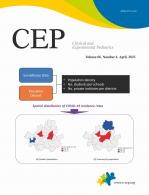With the popularization of smartphones, computers, and the Internet, the use of social media has increased. Most teenagers use the Internet daily. Social media has beneficial effects, including staying connected with friends, meeting new friends with shared interests, and learning new information. However, it also has detriments, such as exposure to harmful content (e.g., sex, drugs, violence), exposure to dangerous people, cyber bullying, privacy concerns like sharing personal information with strangers, and exposure to excessive advertising [1]. Recent research has shown that social media use is associated with adverse health problems such as stress, poor sleep quality, and gastrointestinal (GI) conditions such as functional gastrointestinal disorders (FGIDs). Recent articles have described a high prevalence of social media use, an increased incidence of psychological disorders such as anxiety and depression, and decreased quality of life in children with FGIDs [2]. Given the various issues associated with social media usage in the pediatric population, an investigation into its association with pediatric FGIDs could inspire lifestyle changes to treat FGIDs.
FGIDs involve chronic abdominal and GI symptoms (e.g., abdominal pain, dyspepsia, diarrhea, bloating, and constipation) that are not due to other medical diseases according to an adequate medical evaluation [3]. FGIDs are very common in children; more than half of pediatric patients visiting our pediatric gastroenterology clinic met one or more symptom-based criteria for FGIDs [4]. Pediatric FGIDs, in which pain is predominant, are termed functional abdominal pain disorders and consist of 4 categories: functional dyspepsia, irritable bowel syndrome, abdominal migraine, and functional abdominal pain not otherwise specified [3]. Previous studies of the pathophysiology of FGIDs have shown changes in GI motility and visceral hypersensitivity, while recent studies focused on the fundamental role of intestinal microorganisms and intestinal immune responses, altered intestinal permeability, diets, genetic factors, and brain-gut axis interactions [5]. The brain-gut axis is a bidirectional communication network between the central nervous system (CNS), autonomic nervous system, enteric nervous system (ENS), and the hypothalamic-pituitary-adrenal axis [6]. Environmental stress, whether physical or psychosocial, is believed to play an important role in FGIDs, and symptoms may result from changes in the brain-gut axis that connects the CNS to the ENS [7]. Stressful life events are associated with worsening symptoms in children with recurrent abdominal pain who have higher levels of anxiety and depression than healthy children, and the anxiety and depression levels often correlate with symptom duration [8]. FGIDs result from a complex interplay between biological, psychological, and social factors and can be treated satisfactorily only when all factors are considered. Psychological and social influences may affect symptom perception, healthcare-seeking behaviors, and outcomes among patients with FGIDs. These psychosocial factors affect bowel function, pain experience, health-related quality of life, healthcare access, and healthcare costs [7].
Most social media applications require users to be at least 13 years old. However, a recent poll of parents reported that 49% of children aged 10–12 years and 32% of children aged 7–9 years use social media apps [9]. The ongoing pandemic has made life more difficult, particularly with the growing influence of social media. It is important to note that social media and text messages, which are essential to teenage life at school and home, can lead to anxiety, increased feelings of depression and loneliness, and lower self-esteem. Emotional stress, depressive feelings, and anxiety caused by social media use can trigger FGIDs [2]. From this perspective, screen time control can also be a therapeutic strategy for FGIDs.
Schools and families can play a positive role in helping children navigate screen use and social media. Parents and caregivers must find an appropriate balance for screen time and be good models of screen time. For example, if the family agrees not to use it as part of family dinner, parents should refrain from using their phones. Koreans have considered the importance of education at the dining table and have emphasized personality and etiquette education at the dining table with the entire family. It will be helpful if the family gathers at a set time and place to eat, turns off the TV during meals, does not use smartphones, shares daily life while having a conversation, and empathizes and praises instead of using negative words.





 PDF Links
PDF Links PubReader
PubReader ePub Link
ePub Link PubMed
PubMed Download Citation
Download Citation


